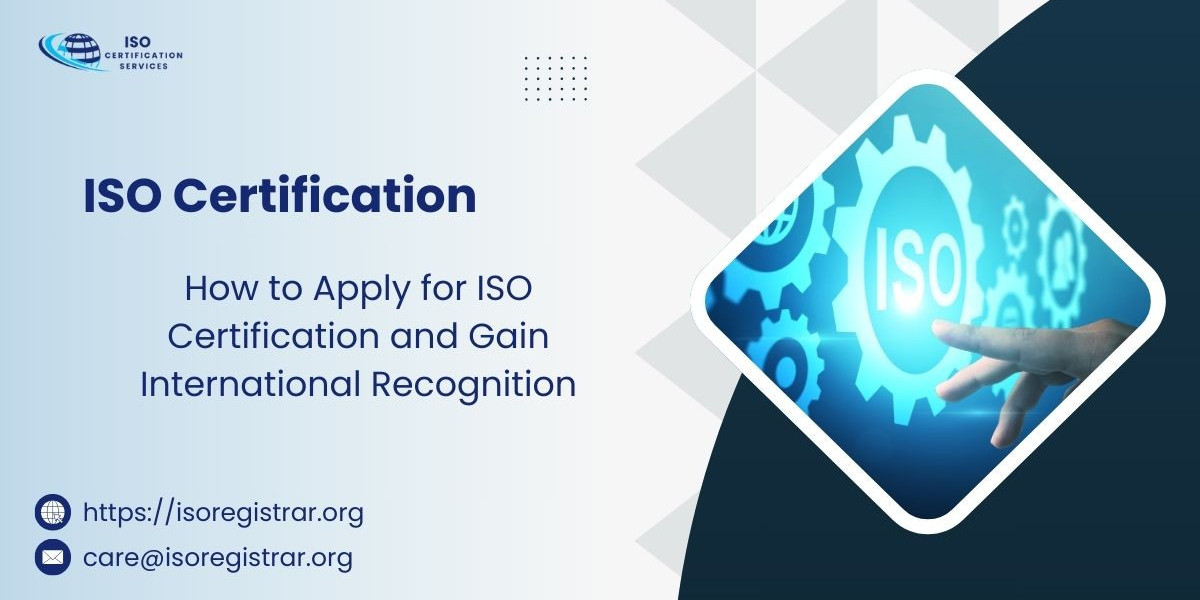In today’s competitive business environment, ISO certification has become a vital tool for organizations looking to demonstrate their commitment to quality, efficiency, and customer satisfaction. Whether you're a small business owner or part of a large corporation, achieving ISO certification can significantly enhance your business’s credibility, reputation, and opportunities in both local and international markets.
ISO Registration is recognized globally and signifies that your products, services, or systems meet internationally recognized standards. By obtaining an ISO certification, you open up a wide range of benefits, including gaining international recognition, improving operational efficiency, enhancing customer trust, and increasing market share.
In this guide, we will take you through the process of applying for ISO certification step-by-step, from understanding what ISO certification is, its benefits, the different types of ISO certifications, and the application process. By the end of this article, you will have a clear understanding of how to apply for ISO certification and use it to gain international recognition.
What is ISO Certification?
ISO certification refers to the process of obtaining certification from a recognized certification body that your company adheres to a set of internationally recognized standards established by the International Organization for Standardization (ISO). These standards ensure that an organization’s products, services, or management systems meet the required quality and safety benchmarks.
ISO standards cover a wide range of areas, including quality management, environmental management, information security, and more. The most commonly known and widely sought-after ISO certifications include:
ISO 9001: Quality Management System (QMS)
ISO 14001: Environmental Management System (EMS)
ISO 27001: Information Security Management System (ISMS)
ISO 45001: Occupational Health and Safety Management System (OHSMS)
ISO 22000: Food Safety Management System (FSMS)
Each certification focuses on a different aspect of an organization’s operations, and the specific certification you apply for will depend on the nature of your business and the standards you want to meet.
Benefits of ISO Certification
International Recognition: ISO certification is recognized globally. It gives your company credibility and trustworthiness, making it easier to expand into international markets. Many clients, especially from overseas, prefer doing business with ISO-certified organizations as it assures quality, safety, and reliability.
Improved Customer Satisfaction: ISO standards, particularly ISO 9001, help improve product and service quality. By adhering to ISO standards, you create a customer-focused culture in your organization, leading to higher customer satisfaction and loyalty.
Enhanced Efficiency and Productivity: ISO certifications promote continuous improvement, allowing organizations to streamline processes and eliminate inefficiencies. This can result in cost savings, better resource utilization, and higher productivity.
Competitive Advantage: ISO certification sets you apart from competitors who do not have certification. It can be a powerful marketing tool that enhances your brand image and makes your company more attractive to potential clients and partners.
Compliance with Legal and Regulatory Requirements: ISO standards help ensure that your company is compliant with local, national, and international regulations. This reduces the risk of legal issues and fines due to non-compliance.
Risk Management: ISO certifications, especially ISO 27001 for information security, help you manage and mitigate risks in your business. This ensures that your data, resources, and operations are secure and well-protected.
Different Types of ISO Certifications
ISO offers a broad range of certifications that focus on different aspects of business operations. Below are some of the most popular ISO certifications:
ISO 9001 (Quality Management System): ISO 9001 is one of the most widely recognized ISO certifications. It focuses on quality management, emphasizing customer satisfaction, continuous improvement, and consistent product quality.
ISO 14001 (Environmental Management System): ISO 14001 helps organizations establish effective environmental management systems. It focuses on reducing the environmental impact of business activities, improving resource efficiency, and meeting environmental regulations.
ISO 45001 (Occupational Health and Safety Management System): ISO 45001 aims to ensure that organizations provide a safe and healthy working environment. It helps businesses manage occupational health and safety risks to minimize accidents, injuries, and illnesses.
ISO 27001 (Information Security Management System): ISO 27001 is focused on information security. It helps organizations protect sensitive information from cyber threats, data breaches, and other security risks.
ISO 22000 (Food Safety Management System): ISO 22000 focuses on food safety and is crucial for businesses in the food industry. It helps ensure that food safety hazards are controlled at all stages of the food supply chain.
ISO 50001 (Energy Management System): ISO 50001 helps organizations improve their energy efficiency, reduce energy consumption, and lower costs. It is ideal for companies aiming to reduce their carbon footprint.
ISO 20000 (IT Service Management): ISO 20000 applies to organizations providing IT services. It helps ensure that IT services are delivered efficiently, effectively, and in alignment with business goals.
How to Apply for ISO Certification: A Step-by-Step Process
Applying for ISO certification involves several steps. Here’s a simplified guide to help you understand the process of obtaining an ISO certificate.
Choose the Right ISO Standard: Select the ISO standard that fits your business needs and aligns with your goals.
Visit the Certification Portal: Go to the official ISO certification website.
Fill Out the Application Form: Complete the online form, ensuring all details are accurate.
Submit Your Application: Review, submit, and double-check all details.
Payment: After submitting the form, pay the nominal charges.
Certificate Confirmation: A consultant confirms the ISO standard you're applying for.
Receive Your ISO Certificate: Once it’s approved, your ISO certificate will be sent to your registered email.
Common Challenges in the ISO Certification Process and How to Overcome Them
Lack of Awareness: Employees may be unaware of the ISO standards or the importance of certification. To overcome this, conduct regular training sessions and raise awareness about the benefits of ISO certification.
Inadequate Documentation: Some organizations struggle with creating the necessary documentation to comply with ISO standards. Ensure you dedicate time to document all processes and establish clear procedures before applying.
Resistance to Change: Employees may resist changes to existing practices. To manage this, ensure clear communication, involve employees in the process, and emphasize the benefits of ISO certification.
Note: Get Iso 9001 Certification in simple steps
Conclusion
ISO certification is a powerful tool that can enhance your business’s credibility, operational efficiency, and marketability. By following the detailed steps outlined in this guide, you can navigate the process of applying for ISO certification and use it to gain international recognition for your products, services, and systems. Whether you are looking to improve quality, environmental management, or occupational safety, achieving ISO certification demonstrates your commitment to high standards and continuous improvement.
The certification process may seem complex, but with the right preparation, commitment, and support, it can be a valuable investment for the long-term success and growth of your business.









